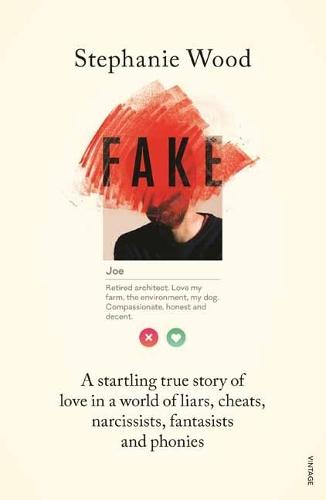 I’d hate to be misunderstood: I’m looking for a man but without the least romantic interest. It’s long over. These days, more than a year since we parted, I think of him as a specimen. Today I’m on a field trip to study his habitat. But I’m jittery; I do not want to encounter this creature. Once, in his smiling eyes I saw good and gentle things. I held him tight and hoped for so much. Now I know that the smile was a simulation, the eyes black holes. I know to keep my distance.
I’d hate to be misunderstood: I’m looking for a man but without the least romantic interest. It’s long over. These days, more than a year since we parted, I think of him as a specimen. Today I’m on a field trip to study his habitat. But I’m jittery; I do not want to encounter this creature. Once, in his smiling eyes I saw good and gentle things. I held him tight and hoped for so much. Now I know that the smile was a simulation, the eyes black holes. I know to keep my distance.
Fake was a riveting read, almost like a crime novel. When renowned, successful journalist and writer Stephanie Wood is played by a narcissistic con man, she falls to pieces – and then pieces herself together again, bit by bit.
Part of her recovery was to use her journalistic training to turn detective and track down the truth about ‘Joe’, the man she meets online. A retired architect turned grazier, raising rare-breed sheep in country NSW, he’s unassuming – driving a beaten-up old car even though he’s filthy rich – and caring, intelligent and honest. Their connection is deep. As far as Wood is concerned, it’s love. She starts to believe they have a future together.
But not long after she starts her relationship with Joe, cracks start to appear in the love story. He makes last minute changes and cancellations. He’s elusive for days at a time. The excuses escalate. Reading how Wood was brought to an extreme and disabling state of anxiety and self-doubt and low self-esteem, it’s easy to see how it can happen. You don’t have to be stupid. Like Wood, most of us want to trust; we want to believe people are good and honest and mean what they say. Most of us are not expecting to meet with deception, lies and manipulation. As Wood digs into Joe’s life she finds he had no country acres, no rustic shack, no sheep. His Sydney house belonged to his ex-wife. He drove an old car because he was bankrupt and in debt. And as a final sting, he was often unavailable because he was in a relationship with another woman at the same time. She exposes him as a narcissist, a fantasist. A fake.
It must have taken real courage for Wood to expose her intimate story in this way but there’s ultimately a hopeful message. To get past the shame, the self-doubt, the anxiety and distress, Wood concentrated on healing – and experienced what psychologists call ‘post-traumatic growth’. Life became good again. Different – with no happy ending with a handsome prince, or even a middle-aged grazier – but good.
Forget the life you wanted or expected, grab the life you have, she writes. Stop belting yourself up… Look for joy everywhere
